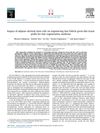 12 citations,
December 2009 in “Amino Acids”
12 citations,
December 2009 in “Amino Acids” Putting α-methylspermidine on mouse skin can start hair growth.
 11 citations,
March 2021 in “Journal of Bioscience and Bioengineering”
11 citations,
March 2021 in “Journal of Bioscience and Bioengineering” Adding human fat-derived stem cells to hair follicle grafts greatly increases hair growth.
 11 citations,
February 2018 in “Archives of Pharmacal Research”
11 citations,
February 2018 in “Archives of Pharmacal Research” Finasteride reduces melanin production, possibly treating hyperpigmentation and melanoma, but needs more safety research.
 10 citations,
September 2020 in “Archives of Dermatological Research”
10 citations,
September 2020 in “Archives of Dermatological Research” Both methods improve hair density and thickness; double-spin may be more effective.
 10 citations,
April 2019 in “Environmental Science and Pollution Research”
10 citations,
April 2019 in “Environmental Science and Pollution Research” Eating selenium-rich rice improved antioxidant activity and signs of aging in mice.
 10 citations,
January 2003 in “Seminars in reproductive medicine”
10 citations,
January 2003 in “Seminars in reproductive medicine” The article explains how to identify and treat excessive hair growth in women, which can be distressing and may signal other health problems.
 6 citations,
March 2021 in “Journal of Cosmetic Dermatology”
6 citations,
March 2021 in “Journal of Cosmetic Dermatology” PRP injections promote hair growth and increase hair density in androgenic alopecia.
 6 citations,
October 2020 in “Journal of Cellular and Molecular Medicine”
6 citations,
October 2020 in “Journal of Cellular and Molecular Medicine” 3D culture helps maintain hair growth cells better than 2D culture and identifies key genes for potential hair loss treatments.
 6 citations,
October 2019 in “Jo'jig gonghag gwa jaesaeng uihag/Tissue engineering and regenerative medicine”
6 citations,
October 2019 in “Jo'jig gonghag gwa jaesaeng uihag/Tissue engineering and regenerative medicine” Rice bran extract boosts melanin production in hair follicles.
 6 citations,
June 2013 in “British Journal of Dermatology”
6 citations,
June 2013 in “British Journal of Dermatology” Intense pulsed light treatment mainly damages pigmented hair parts but spares stem cells, allowing hair to regrow.
 5 citations,
April 2018 in “Journal of Dermatological Science”
5 citations,
April 2018 in “Journal of Dermatological Science” Adjusting estradiol-ANGPT2 levels can promote hair growth in female pattern hair loss.
 5 citations,
January 2017 in “Elsevier eBooks”
5 citations,
January 2017 in “Elsevier eBooks” The document concludes that cosmetics need biocompatible, eco-friendly ingredients due to aging populations and demand for effective products.
 3 citations,
February 2019 in “Journal of Cosmetic Dermatology”
3 citations,
February 2019 in “Journal of Cosmetic Dermatology” The effects of estrogen on human scalp hair growth are unclear and need more research.
 3 citations,
June 2017 in “Methods”
3 citations,
June 2017 in “Methods” Researchers created a model to understand heart aging, highlighting the role of microRNAs and identifying key genes and pathways involved.
 3 citations,
January 2011 in “Annals of Dermatology”
3 citations,
January 2011 in “Annals of Dermatology” Blocking EGFR in skin cells doesn't majorly increase inflammation markers.
 1 citations,
January 2021 in “Journal of biological chemistry/The Journal of biological chemistry”
1 citations,
January 2021 in “Journal of biological chemistry/The Journal of biological chemistry” FLCN helps control iron levels in cells.
 1 citations,
January 2015 in “Genetics and Molecular Research”
1 citations,
January 2015 in “Genetics and Molecular Research” Stopping S100A3 activity slows down hair growth in mice.

Blocking the Mitochondrial Pyruvate Carrier causes stress in hair follicles, which can be reduced by an ISR inhibitor.
 March 2024 in “Medical lasers”
March 2024 in “Medical lasers” Multiple-wavelength radiation helps hair grow by boosting early hair follicle development.
 February 2024 in “Frontiers in physiology”
February 2024 in “Frontiers in physiology” Lymphatic vessels are important for skin repair and could affect skin disease treatments.
 February 2024 in “Planta”
February 2024 in “Planta” TRM21 helps control flavonoid production and root hair growth in Arabidopsis thaliana.
 December 2023 in “bioRxiv (Cold Spring Harbor Laboratory)”
December 2023 in “bioRxiv (Cold Spring Harbor Laboratory)” AP-2α and AP-2β proteins are essential for healthy adult skin and hair.
 October 2023 in “Frontiers in medicine”
October 2023 in “Frontiers in medicine” Targeted immunotherapy could be a promising new treatment for hair regrowth.
 July 2022 in “Research Square (Research Square)”
July 2022 in “Research Square (Research Square)” Certain miRNAs may play a role in sheep hair follicle development, which could help improve wool production.
 August 2018 in “Journal of Investigative Dermatology”
August 2018 in “Journal of Investigative Dermatology” Polyunsaturated fatty acids, like arachidonic acid and eicosapentaenoic acid, can promote hair growth and may help treat hair loss.
 August 2018 in “Journal of Investigative Dermatology”
August 2018 in “Journal of Investigative Dermatology” A woman with dermatomyositis improved after treatment for neck panniculitis, suggesting similar treatment for related conditions.
 August 2018 in “Journal of Investigative Dermatology”
August 2018 in “Journal of Investigative Dermatology” The conclusion is that using light-sheet fluorescence microscopy with a special solution can effectively create detailed 3D images of human skin for dermatological research.
 April 2017 in “Journal of Investigative Dermatology”
April 2017 in “Journal of Investigative Dermatology” Deep phenotyping helps distinguish between xeroderma pigmentosum and trichothiodystrophy, aiding in diagnosis and treatment.
 April 2016 in “Journal of Investigative Dermatology”
April 2016 in “Journal of Investigative Dermatology” Gypenosides from Gynostemma pentaphyllum were found to have anti-aging effects, increasing skin collagen and reducing wrinkles.

Avicennia marina extract and avicequinone C can potentially promote hair growth and treat hair loss by interfering with hair loss mechanisms and boosting growth factors.






























